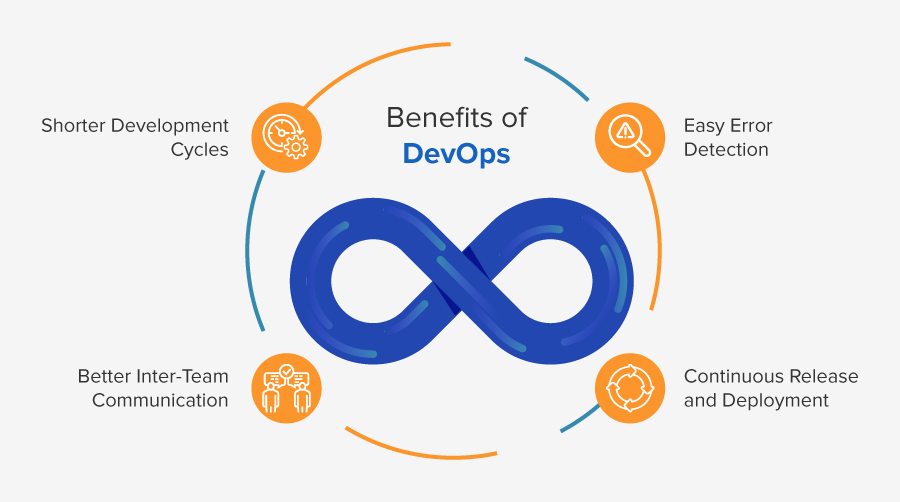The Importance of DevOps and Its Career Scope
DevOps is the latest buzzword in IT. It has been catalysing change by bringing together development and infrastructure operations.
However, research shows that 75% of DevOps projects are likely to fail at meeting expectations due to lack of organisational knowledge and resistance to change.
Therefore, there is a need for experienced professionals to fill the gap. In this blog post, we look at the importance and scope of a career in DevOps.
Ready? Let’s dig deeper!

What is DevOps?
DevOps is a set of practices, tools, and cultural philosophies that enable the automation and integration of processes between software development and IT.
It promotes cross-team communication and collaboration, as well as technology automation.
DevOps first came around in 2007 when software development and IT operations communities raised concerns about the traditional software development model.
In this model, developers who wrote code worked in silos with the operations team and deployed and supported the code.
After the introduction of DevOps, development and operations were integrated into one continuous process.
Now that we know what DevOps is, let’s learn more about its benefits.

Benefits of DevOps
Some of the benefits of DevOps for businesses are :
Shorter Development Cycles
When development and operation teams work in silos, it becomes challenging to know if the application is ready for operations.
When the development team turns over an application, the operations cycle is often extended unnecessarily.
Therefore, when development and operations teams work together, applications are made ready-for-use much more quickly.
Shorter development cycles give businesses an edge over competitors and help them grow.
Easy Error Detection
DevOps facilitates a culture of knowledge sharing across teams. Monitoring and testing code at every step improves the overall build quality of the application.
As teams share feedback with each other, defects get detected and resolved early on in the development process.
Better Inter-Team Communication
DevOps provides an atmosphere of mutual collaboration, effective communication, and integration across teams
DevOps culture promotes collective performance instead of individual goals. It makes the entire process transparent, as individuals work towards a common goal.
Continuous Release and Deployment
These days, software development requires teams to continuously deliver top-quality software and reduce time-to-market.
DevOps helps organisations to achieve this through automation.
Development and operations teams develop and integrate code instantly with the help of automated Continuous Integration (CI) and Continuous Development (CD) pipelines.
DevOps facilitate continuous release and deployment with improved quality and efficiency.
Career in DevOps
Here are a few DevOps designations, and the skills you’ll need to get into the role :
DevOps Release Manager
A release manager is an experienced professional in the software industry.
For this role, you should have strong knowledge of the end-to-end software development and deployment lifecycle.
Excellent communication is another important skill required to become a release manager.
This is because you’ll need to communicate with both management professionals and the technical team involved in a project.
DevOps Lead
A DevOps lead is responsible for proper execution of the DevOps cycle.
You need to have extensive knowledge of various automation tools used by different team members.
You should also be able to decide which tools and technology would be appropriate according to the needs of the project.
Security Engineer
In the DevOps context, security is referred to as DevSecOps.
Key responsibilities include using different tools for code quality checking, configuration management, server security, as well as firewall implementation.
The emphasis is on a continuous security philosophy.
Contrary to the waterfall software development lifecycle where security is implemented only when code is being released, security needs to be maintained throughout the cycle in DevOps.
Ethical hacking, computer forensics, network architecture, and security testing are some of the key skills required for the role of a security engineer.
Automation Engineer
An automation engineer is responsible for developing and maintaining the CI/CD process for all applications and their builds using tools such as Maven, Jenkins, Git, Gerrit, and Gradle.
They automate configuration management across infrastructure and platforms using tools such as Ansible, Chef, Puppet, SaltStack, and Fabric8.
Other responsibilities of an Automation Engineer include building and administering virtual machines and containers using tools such as Vagrant, Docker and Kubernetes.
They also log and monitor activities using tools such as Nagios, Zabbix, ELK Stack, and Splunk.
To become an automation engineer, get certified in automation, robotics, programming tools, as well as testing and security.
DevOps Testing Professional
A testing professional aligns their test design, cases, and automation with the DevOps framework being used.
Their key responsibility is to ensure that code changes work as intended and that they do not break the software as a whole.
The role requires you to ensure that code meets the success and acceptance criteria put forth by the release manager.
Integration Specialist
An integration specialist works with infrastructure operations and software development to build the integration and continuity of code.
They are responsible for creating a holistic view of the working environment. They also support engineering and testing in meeting infrastructure needs.
In addition to this, they work with cloud architects to implement containers as per the requirements of software development engineers.
Upskill Yourself in DevOps
If you’re looking to build a career in DevOps, there are a range of eLearning courses available.
At SkillStone, we offer multiple DevOps courses to upskill students in the technology. Our basic to advanced courses are the right fit for IT, non-IT, and working professionals alike.
Should you have any questions, you can reach out to us at [email protected] and we’ll take it from there.
About SkillStone
SkillStone, an initiative by Grazitti Interactive, gives you an edge in landing your most coveted job.
With skill-based eLearning courses, we help you cover the gap between the script and the screen. We offer a diverse set of courses that’ll earn you certifications in tech skills and enable you to build a career in the field.




